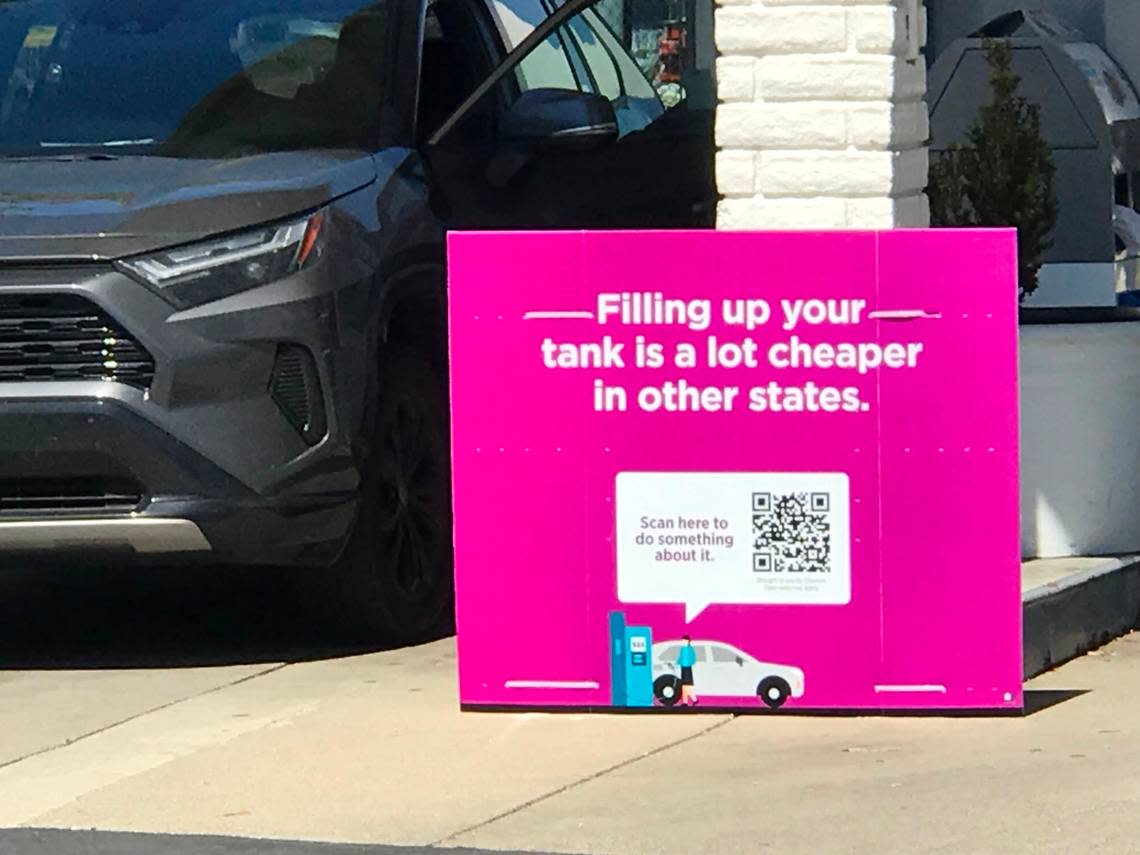Save your advertising dollars, Big Oil. Californians already know gas ain’t cheap | Opinion

Big Oil is investing big bucks in a PR campaign that tells us — insert drum roll here — that gas is way more expensive in California.
Shocking, right?
To be fair, the oil industry also is attempting to educate us on why gas costs more in California.
Naturally, this campaign casts Sacramento politicians — not oil company execs — as the bad guys.
The Western States Petroleum Association has billboards on major highways that direct drivers to a website, factspergallon.com, that blames California’s high gas prices on taxes and fees, environmental regulations and local bans on new gas stations.
(So far, it’s mostly small, upscale Northern California communities like St. Helena, Calistoga and Yountville that have passed bans, though Sacramento is considering it.)
Chevron has positioned eye-catching, hot-pink signs at their gas pumps that read: “Filling up your tank is a lot cheaper in other states.” (Again, who knew?)
The sign includes a QR code that provides helpful links to state lawmakers, in case customers want to call or write them. It also includes “talking points” like this: “I ask you to act now to protect my access to affordable gas by prioritizing fair and equitable regulations for all Californians, not just those who can afford new vehicles.”
Gov. Gavin Newsom is not taking the bait.
“Big Oil is Spending Millions on a Campaign Lying About Gas Prices Instead of Passing Down Savings to Consumers” is the headline on a March statement from the Governor’s Office:
“The price of a gallon of gasoline overwhelmingly consists of profits, marketing, distribution, and the price of crude oil,” it goes on to say.
So who do we believe? Big Oil or Big Government? Or are both positions valid, at least to some degree?
Sure, gas is more expensive here — but so is everything else
According to the latest AAA data, in California a gallon of regular averages $5.46 compared to a nationwide average of $3.64.
Ouch!
Then again, almost everything is more expensive here, especially housing. In some parts of California, a house is considered a bargain if it costs under $1 million, which is one of the reasons people are relocating to other states.
Some of those higher costs are linked to tougher environmental regulations.
Take gas, for example.
For years, California has required cleaner-burning gasoline to reduce smog. That adds 10 cents a gallon to the price of gas, according to Severin Borenstein, director of UC Berkeley’s Energy Institute.
While air quality is still bad in parts of the state — especially the Los Angeles Basin — the regulations have made a difference.
“Most recently, year-over-year trends have resulted in reductions in L.A. air pollution of 10.6% from 2017 to 2018, and another 11.8% from 2018 to 2019,” the website iqair reported.
Would we want to sacrifice air quality to save 10 cents a gallon? Of course not.
Also, those high gas taxes Big Oil complains about? They help pay for roads, which is something Californians have supported at the ballot box. In 2018, 57% of voters defeated Proposition 6, a measure to repeal a 12-cent-per-gallon increase in the gas tax passed by the Legislature in 2017.
With gas prices being what they are now, voters might not be so inclined to support taxes today. But if we were to reduce the gas tax, what would replace it? More tolls? Increased vehicle license fees? Or maybe a user tax based on vehicle miles traveled, rather than the number of gallons purchased.
That’s a conversation we can — and should — have, especially as the number of electric vehicles increases, leaving the state with less gas tax revenue.
But Big Oil shouldn’t drive that discussion. Nor should it dictate air quality decisions.
Oil industry must evolve
California has charted a path. It’s moving away from fossil fuels, and the oil industry needs to acknowledge that its role is changing, especially in environmentally progressive states.
Instead, Big Oil tries desperately to hang on, no matter who it hurts.
One prime example: It succeeded in placing a measure on California’s November ballot to repeal SB 1137, which would prohibit new oil and gas wells within 3,200 feet of homes, schools, nursing homes and hospitals.
Never mind that research has shown that exposure to oil and gas well sites is linked to increased risk of premature births. Or that residents who live near active oil wells reported more wheezing. Or that a Colorado School of Public Health study found that young Colorado residents diagnosed with acute lymphocytic leukemia were “4.3 times more likely to live in the densest area of active oil and gas wells than those with other cancers.”
Now the oil industry is using signs and billboards and QR codes in an effort to convince the public that it has its best interests in mind? That it’s trying to shine a light on why California’s gas prices are higher than Arizona’s and Utah’s and Georgia’s? That accusations of price gouging are wrong?
Sure, Californians are fed up with high prices, but they aren’t gullible enough to swallow everything the oil industry is dishing out.
If Big Oil really wants to do something for Californians, here’s a suggestion: Show a commitment to the future. Take that money you’re spending on PR and install some EV charging stations next to your gas pumps.

